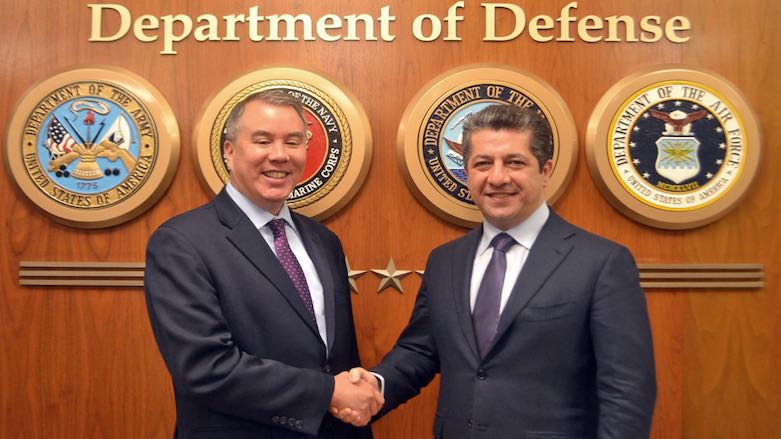Masrour Barzani meets senior Pentagon official

WASHINGTON DC (Kurdistan 24) – Masrour Barzani, Chancellor of the Kurdistan Region Security Council (KRSC), met in Washington on Friday with John Rood, Under Secretary of Defense for Policy, the number three position in the Defense Department.
The meeting—the most senior-level engagement between an official of the Kurdistan Regional Government (KRG) and a Pentagon official in nearly a year—reflects the changing nature of the war against the Islamic State (IS.)
As IS has been driven out of the territory it once controlled, it has gone underground, and “the fight against the terrorist organization has become more of an intelligence operation,” Paul Davis, a former Pentagon analyst, now a Senior Fellow at Soran University, told Kurdistan 24.
Or, as others put it more informally, “IS has gone into al Qaida mode.”
In addition, security has deteriorated since last October, particularly in the disputed territories, after Iraqi forces attacked the Peshmerga in Kirkuk, in a military operation organized by Iran.
“We’re already seeing metrics and indicators that [IS] is back,” Michael Pregent, an advisor to Generals David Petraeus and Raymond Odierno during Operation Iraqi Freedom, and now with the Hudson Institute, explained at a seminar on Friday.
Pregent also noted that the Kurds were far more effective in maintaining security in Kirkuk than the Iraqis have proven to be. The Iraqi Security Forces, including the Popular Mobilization Forces, are there, Pregent said, but “they’re not able to secure it.”
IS’ transforming itself into al Qaida mode and IS’ resurgence are “two big reasons” why Rood would be seeing Barzani now, Davis suggested.

According to a KRSC readout of the meeting, the two officials discussed “the continuing partnership between the Kurdistan Region’s security forces and the Peshmerga with the United States.”
That partnership is reflected in the National Defense Authorization Act, which President Donald Trump signed into law earlier this week and which notes that the Peshmerga “have made, and continue to make, significant contributions” to the US-led campaign “to degrade, dismantle, and ultimately defeat” IS.
In his meeting with Rood, Barzani thanked the US for supporting the Peshmerga in the fight against IS, as they discussed the “continuing battle” against the terrorist organization and other such groups, including “the changing nature of the fight, which requires military and intelligence resources.”
Barzani also “spoke at length about specific measures the US and the Global Coalition can support to organize and strengthen the Peshmerga forces.”
The senior Kurdish and US officials also discussed the formation of the next government in Iraq, following the May 12 elections.
The Kurdistan Democratic Party (KDP) did well, winning some 25 seats, coming in fourth, ahead of the other Kurdish parties and even ahead of some major Arab parties.
“The Kurdistani leadership does not favor nor exclude any list as a partner,” Barzani explained at the Pentagon.
“Rather, it seeks a coalition that will implement the Iraqi constitution in full,” he continued, “and a government based on consensus, balance, and partnership, which is responsive to the needs and rights of the people.”
The US has a major problem in Iraq. It counted on the victory of the current Prime Minister, Haider al-Abadi, but other candidates, including the Iranian-backed list of Hadi al-Ameri, head of the Badr Organization, did better.
The US Special Presidential Envoy for the Global Coalition against IS, Brett McGurk, and Maj. Gen. Qasim Soleimani, head of the Quds Force of Iran’s Islamic Revolutionary Guard Corps, are both in Iraq, each trying to advance a governing coalition that will promote his country’s interests.
The US is so keen to return Abadi to office, that it is reaching out to increasingly dubious parties.
On Saturday, McGurk and the US ambassador to Baghdad, Douglas Silliman, met with the Iranian backed al-Fadheela party in Baghdad.
Entifadh Qanbar, an Iraqi-American and President of the Future Foundation in Washington DC, took strong exception, describing Fadheela as “one of Tehran’s most reliable arms inside Iraq” and explaining that it is notorious “for selling oil on behalf of Iran in Basrah.”
That will become a major problem, of course, as US sanctions on Iranian oil exports take effect on November 5.
Fadheela is a small party, with little influence, Qanbar said. But the US seems to be “desperately shopping around for Abadi,” or so he characterized Saturday’s meeting to Kurdistan 24.
